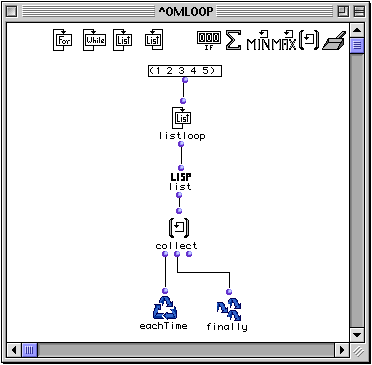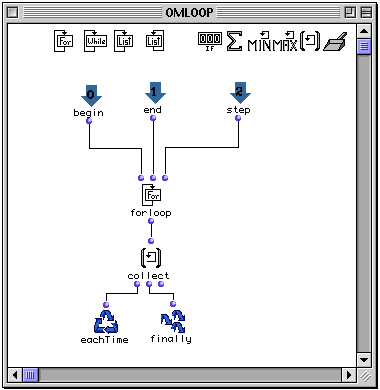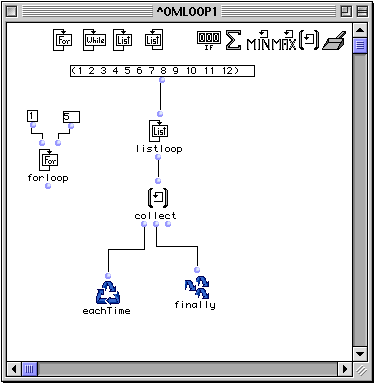OpenMusic Reference
listloop

listloop
(control module) -- Enumerates the elements of a list within omloop
Syntax
listloop list &optional by
Inputs
| name | data type(s) | comments |
|---|---|---|
| list | a list or tree | |
| by | a function name or lambda function |
Output
| output | data type(s) | comments |
|---|---|---|
| first | any | the elements of list , individually and sequentially |
Description
 |
listloop is part of a group of functions for performing iterative loops. They can only be used within an omloop patch window. Since they only function within the context of the entire repeating loop, they (or any function connected to them) cannot be evaluated directly within the patch window. You must evaluate the entire loop. See the entry on omloop for more information.
—|—
listloop is one of the most useful omloop iterators. At each repetition, it returns an element of the list, stepping through them individually, in order. If no other iterators are used, loop execution terminates when the list has been exhausted. In this way, a single function or functions can be made to act on all the elements of a list of data.
Examples
Simple listloop examples
Here we will use listloop to add a level of parentheses to each element of a list:

listloop gives each element of (1 2 3 4 5) to the LISP function list , which makes a one-element list out of it, and the resulting sublists are collected by collect :
? OM->((1) (2) (3) (4) (5))
The list (1 2 3 4 5) could have been connected from outside the omloop module by adding an input:

Using omloop to extract midics from a Voice
Let’s assume we wanted to perform some kind of operation on the pitch values in a Voice , a transposition, for example. The pitch information, in midics, is not available at any Voice output. The Voice contains a list of Chord objects, however, which each have a midic output. We take the following material in a Voice and plug the third output into a loop with the following internal structure:

The third output of the voice will return a list of Chord objects. This will enter the omloop module where each individual element of that list, i.e. each chord, will be plugged into a Chord factory, of which we can then take the second output, which will be a list of the midics comprising each chord. These will be collected by the collect box, and the result, a list of lists of midics representing each note and chord in the original voice, is returned:
? OM->((5800 5100) (7500) (5300) (7100) (6000 6800 6900) (5600) (5100) (3700))
After that, transposing is as simple as using an arithmetic function to add or subtract a value from the list’s elements.
| Prev | Home | Next |
|---|---|---|
| whileloop | Up | onlistloop |